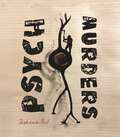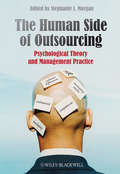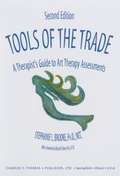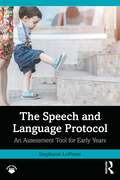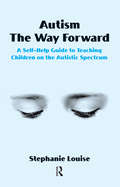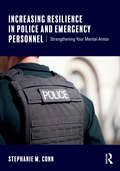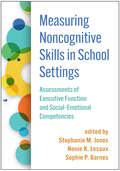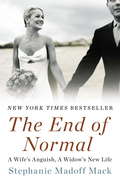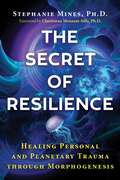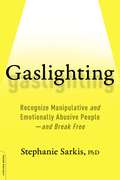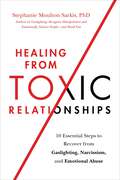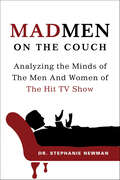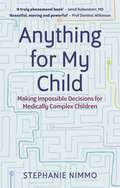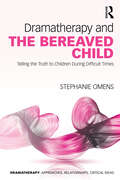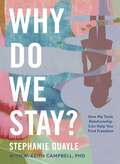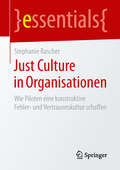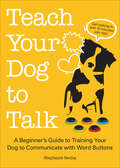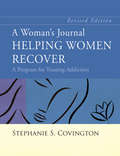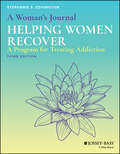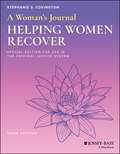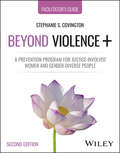- Table View
- List View
Psych Murders (Made in Michigan Writers Series)
by Stephanie HeitStephanie Heit’s hybrid memoir poem blasts the page electric and documents her experience of shock treatment. Using a powerful mélange of experimental forms, she traces her queer mad bodymind through breathlessness, damage, refusal, and memory loss as it shifts in and out of locked psychiatric wards and extreme bipolar states. Heit survives to give readers access to this somatic, visceral rendering of a bipolar life complete with sardonic humor, while showing us the dire need for new paradigms of mental health care outside closets, attics, prisons, and wards. Psych Murders adds a vital layer of lived experience of electroshocks and suicidal ideation to the growing body of literature of madness and mental health difference.
The Human Side of Outsourcing: Psychological Theory and Management Practice
by Stephanie J. MorganOutsourcing is now a strategic choice for many companies and a continuing issue for managers and consultants. The transfer, negotiation and ongoing management of outsourced contracts all demand a great deal of people management. Yet, while the implications for those directly affected may be numerous and wide-ranging, very little has been written on how to sensitively and successfully manage the transfer of such individuals – along with the emotional needs of those left behind. This book considers The Human Side of Outsourcing, integrating theory and practice to offer state-of-the-art advice for those responsible for implementation in the field along with insightful analysis for researchers and students of work psychology. Examining problems and solutions from employee and employer perspectives, Stephanie J. Morgan provides an in-depth study of the psychological theory, management practice and level and type of support required to engage staff and improve outcomes. Real-world case studies illustrate all the key issues involved, along with their implications for HR, line management, organizational performance and employees themselves.
Tools of the Trade: A Therapist's Guide to Art Therapy Assessments (Second Edition)
by Stephanie L. BrookeThis new edition with its revised title provides critical reviews of art therapy tests along with some new reviews of assessments and updated research in the field. It is comprehensive in its approach to considering reliability and validity evidence provided by test authors. Additionally, it reviews research on art therapy assessments with a variety of patient populations. The book contains helpful suggestions regarding the application of art therapy assessments. Specific areas covered include individual, group, family, and multicultural assessment techniques. The desirable and undesirable features of a variety of art therapy assessments are deliberated. This book will be a valuable resource for practitioners who use art therapy as an adjunct or primary therapy, and it will serve to enhance clinical skills, making therapy more effective for each patient who participates in the assessment process. The book critiques a series of art therapy assessments-from traditional art therapy approaches to current releases. The goal of this work is to assist mental health professionals in selecting assessments that yield reliable and valid clinical information regarding their clients. Of special interest is the author's approach to writing the results of a series of art therapy assessments in an effort to provide a more complete indication of client dynamics and issues. It will be a valuable resource for practitioners who use art therapy as an adjunct or primary therapy, and it will serve to enhance clinical skills, making therapy more effective for each patient who participates in the assessment process.
The Speech and Language Protocol: An Assessment Tool for Early Years
by Stephanie LoPrestiThis valuable book addresses the common problems faced by speech‑language pathologists, offering solutions and strategies for more effective service delivery.Stephanie LoPresti introduces ‘The Protocol,’ a child development‑based approach that merges principles from developmental psychology and speech‑language pathology. The book covers a wide range of speech and language issues, including receptive, expressive, pragmatic, feeding, and play development, making it a versatile resource for clinicians. It is designed to be easy to use, with movable elements that adapt to a child’s progress from short‑ to long‑term milestones and goals. It emphasizes the concept of the zone of proximal development, ensuring that clinicians work with clients just above their current level of functioning, leading to meaningful progress.Accompanied by downloadable worksheets to assess progress, it will be an essential resource for all speech and language pathologists, particularly those working with young children. It will also be useful to students and educators in the field of speech‑language pathology seeking evidence‑based strategies for working with clients, as well as healthcare professionals, researchers, and educators interested in child development and language acquisition.
Autism, The Way Forward: A Self-Help Guide to Teaching Children on the Autistic Spectrum
by Stephanie LouiseSpecifically written for all those families who are unable to receive funding for their child's programme, and is an invaluable tool for new tutors coming into the field. The book is a step-by-step guide to setting up and running a home programme, which applies full communication in order to meet the needs of the child more fully. It guides the reader through the various stages, showing them what to include in their programme, when, why and how. Included in the book is a section on what to do when things go wrong on your programme. It also shows how the methodologies of behaviourism and psychotherapy are combined to give a synergetic effect, with all other methods supporting these by applying calming and performance-enhancing strategies.
Increasing Resilience in Police and Emergency Personnel: Strengthening Your Mental Armor
by Stephanie M. ConnIncreasing Resilience in Police and Emergency Personnel illuminates the psychological, emotional, behavioral, and spiritual impact of police work on police officers, administrators, emergency communicators, and their families. Author Stephanie Conn, a clinician and researcher as well as a former police officer and dispatcher, debunks myths about weakness and offers practical strategies in plain language for police employees and their families struggling with traumatic stress and burnout. Sections of each chapter also offer guidance for frequently overlooked roles such as police administrators and civilian police employees. Using real-world anecdotes and exercises, this book provides strengths-based guidance to help navigate the many complex and sometimes difficult effects of police and emergency work.
Measuring Noncognitive Skills in School Settings: Assessments of Executive Function and Social-Emotional Competencies
by Stephanie M. Jones, Nonie K. Lesaux and Sophie P. BarnesChildren's social–emotional and self-regulation skills are critical for success in school and, ultimately, in the workplace. How can educators determine the most effective approaches for measuring students' interpersonal competencies? And how can they use the data to improve their own practice? Relevant for school leaders, educators, researchers, and other stakeholders, this book brings together leading experts from multiple disciplines to discuss the current state of measurement and assessment of a broad range of noncognitive skills and present an array of innovative tools. Chapters describe measures targeting the individual student, classroom, whole school, and community; highlight implications for instructional decision making; examine key issues in methodology, practice, and policy; and share examples of systematic school- and districtwide implementation.
The End of Normal
by Stephanie Madoff MackA New York Times bestseller, the explosive and heartbreaking memoir from the widow of Mark Madoff and the daughter-in-law of Bernard Madoff When the news of Bernard Madoff’s Ponzi scheme broke, no one was more shocked than the members of his own family. Before then, Madoff’s son, Mark, and daughter- in-law, Stephanie, had built an idyllic life. Yet, while Mark’s thriving business was entirely separate from his father’s now notorious fund, he and Stephanie found themselves in the eye of the storm—and grappling with their own sense of betrayal. Mark refused to see or speak to his parents, and on the second anniversary of his father’s arrest, he hanged himself. Left to raise her children as a single mother, Stephanie tells the real story of her marriage to Mark, of being a part of the Madoff family, and of life for two years following her father-in-law’s arrest and incarceration. The End of Normal is a searing inside look at one of the most controversial stories of our time, and an extraordinary memoir of surviving personal tragedy amid public scandal. .
The End of Normal: A Wife's Anguish, A Widow's New Life
by Stephanie Madoff Mack Tamara JonesAn explosive, heartbreaking memoir from the widow of Mark Madoff and daughter-in-law of Bernard Madoff, the first genuine inside story from a family member who has lived through -- and survived -- both the public crisis and her own deeply personal tragedy. Stephanie Mack, the daughter-in-law of Bernie Madoff, share's her life story. Bernie scammed many Americans, but Stephanie and her husband knew nothing about his activities. Still his actions had a devistating impact on Stephanie, her husband, and her children.
The Secret of Resilience: Healing Personal and Planetary Trauma through Morphogenesis
by Stephanie MinesRestore resilience at its developmental source through energy medicine• Shares the author&’s journey of learning the healing art of Jin Shin, discovering the embryological roots of resilience, and healing her own trauma• Explores how the Jin Shin sites correlate with the Chinese Extraordinary Meridians and with specific embryological events• Shows how subtle touch in combination with trauma resolution amplifies neuroresilience, enhances creativity, restores motivation, and heals the fragmentation and disconnection associated with trauma and shockWhen neuroscientist Stephanie Mines started practicing the hands-on healing Art of Compassion, she began to unravel the mystery of trauma and the secret to resilience. As a survivor of early childhood abuse, police brutality as a social justice activist, and a series of dysfunctional and abusive relationships, Mines was profoundly curious about how the human nervous system finds resilience despite the cumulative burden of chronic stress and traumatic life events. While earning her doctorate in neuropsychology, she met Mary Iino Burmeister, master of the Art of Compassion, or Jin Shin Jyutsu. Art of Compassion consists of non-invasive touch, using the fingertips, on sites of the body that are similar to acupuncture points. After the Art of Compassion helped Mines resolve her own trauma and awaken her innate resilience, she began to incorporate it into her clinical research. She discovered that the map of the body she learned from Burmeister sites correlated with the Chinese Extraordinary Meridians or Rivers of Splendor, which develop prenatally. She then began investigating our earliest neurodevelopmental processes and was able to correlate the Extraordinary Meridians with specific embryological events. She found that subtle touch on these sites in combination with trauma resolution amplifies neuroresilience, enhances creativity, restores motivation, and heals the fragmentation and disconnection associated with trauma and shock. Sharing her personal journey as a Wounded Healer, Mines reveals not only how to unlock the secrets of resilience for individual healing but also how embodied resilience will help us heal our wounded planet.
Gaslighting: Recognize Manipulative and Emotionally Abusive People--and Break Free
by Stephanie Moulton SarkisA mental health expert sheds light on "gaslighting"--the manipulative technique used by sociopaths, narcissists, and others--offering practical strategies to cope and break free. Gaslighting is a technique of manipulating others to gain control, often practiced by those with personality disorders (including Narcissistic Personality Disorder, Antisocial Personality Disorder, and Borderline Personality Disorder). Whether it's a spouse, parent, coworker, or friend, gaslighters use a series of manipulation and distraction tactics to distort the truth--from lying, controlling, withholding, triangulation, and more--making their victims question their own reality. Dr. Sarkis delves into the psychology behind the phenomenon, devoting chapters to specific scenarios, such as gaslighting in dating, in relationships, at work, and in families. With warning signs and examples of the destructive consequences along with practical tips and strategies, Gaslighting will help anyone trapped in a manipulative relationship to break free and heal from this toxic behavior.
Healing from Toxic Relationships: 10 Essential Steps to Recover from Gaslighting, Narcissism, and Emotional Abuse
by Stephanie Moulton SarkisFrom the psychologist and author of Gaslighting comes a practical recovery plan outlining ten foundational steps to true healing. Surviving and escaping a toxic or abusive relationship can often only be part of the struggle. Long after, survivors often struggle to heal; your self‑esteem may be damaged, you may feel rage and betrayal, and you may punish and/or blame yourself. The author of Gaslighting and specialist in toxic behavior, narcissistic abuse, and personality disorders, Dr. Stephanie Sarkis has seen it all--and she is here to help you understand how to move forward. In Healing from Toxic Relationships, Dr. Sarkis extends compassion and knowledge to survivors, helping you understand the underpinnings of toxic behavior and how to find peace. Highlighting ten essential steps, Dr. Sarkis provides survivors with an accessible framework that can be applied to anyone preparing to heal: 1. Block or Limit Contact2. Create Your Own Closure3. Forgive Yourself4. Establish Boundaries5. Talk to a Professional6. Practice Self‑Care7. Reconnect8. Grieve9. Look Outward10. Prevent: Keeping Toxic People AwayAnyone who is in a toxic relationship—whether it's with a romantic partner, colleague, family member, or friend—deserves a way out and a path forward. Dr. Sarkis offers help and hope.
Mad Men on the Couch: Analyzing the Minds of The Men And Women of The Hit TV Show
by Stephanie NewmanMad Men has captured the imaginations of millions of viewers, winning fifteen golden globes and four Emmys. Perhaps more than the gorgeously stylized visuals and impeccably re-created history, it's the show's richly drawn characters stumbling through their personal and professional lives that get under our skin and keep us invested.In Mad Menon the Couch, Dr. Stephanie Newman analyzes the show's primary characters through the lens of modern psychology. Lending her trained professional eye, she poses and expertly answers pressing questions such as:Why does Don constantly sabotage himself? Why is Betty such a cold mother and desperately unhappy housewife? (Hint: It's not just because her "people are Nordic.")Why does Pete prevail in adversity when Roger crumbles?Why is Peggy able to rise profesionally in the male jungle of Madison Avenue when Joan can't?Can these characters ever really change?With critical commentary that is both entertaining and insightful, Mad Men on the Couch will provide viewers with a unique persepctive on the show.
Anything for My Child: Making Impossible Decisions for Medically Complex Children
by Stephanie NimmoEvery parent wants the same thing: for their child to enjoy a long and fulfilling life. But what happens when things don't go according to plan? What happens when parents have to become advocates for their child's healthcare needs? Who decides what is in a child's 'best interests'?Stephanie Nimmo faced these questions first-hand when her daughter, Daisy, was diagnosed with a life-limiting condition as a baby. Seen through the lens of Stephanie's own experiences, this sensitive book delves into the complex world of medical ethics and paediatric palliative care. From recognising tipping points to the importance of building relationships with palliative care teams well before crisis, this book explores how medical professionals can better support families throughout their child's care.Interviews with clinicians and snapshots from the lives of patients' families provide insight into the realities of life on both sides of the hospital bed. Compassionate explanations of the conflicting pressures in the hospital system foster understanding and help medical professionals and families work together.
Radikalisierung rechtsextremistischer Lone Actor Terroristen: Zum Einfluss sozialer Isolation und des Internets (Edition Rechtsextremismus)
by Stephanie Ohlrogge Torsten Jörg SelckÜber den Einfluss sozialer Isolation und des Internets auf die Radikalisierung von rechtsextremistischen Lone Actor Terroristen liegen bislang kaum theoretische und empirische Erkenntnisse vor, sodass die Untersuchung an dieser Forschungslücke anknüpft. Auf Basis einer vergleichenden Fallstudie werden praxisnah neue theoretische Erkenntnisse über die Wirkmechanismen der beiden Radikalisierungsfaktoren gewonnen. Insbesondere Online-Plattformen mit radikalen Communities spielen eine zentrale Rolle und können sowohl bei sozial isolierten als auch bei integrierten Einzeltätern gruppenbasierte Radikalisierungsprozesse initiieren.
Childhood, Youth and Emotions in Modern History: National, Colonial And Global Perspectives (Palgrave Studies In The History Of Emotions Ser.)
by Stephanie OlsenChildhood, Youth and Emotions in Modern History is the first book to innovatively combine the history of childhood and youth with the history of emotions, combining multiple national, colonial, and global perspectives.
Dramatherapy and the Bereaved Child: Telling the Truth to Children During Difficult Times (ISSN)
by Stephanie OmensThis book addresses the needs of children experiencing the hospitalization or death of a caregiver or loved one to comprehend and cope with tragedy with the assistance creative non-fictions and dramatic play.Based on the author’s two-decade-long clinical practice and an extensive career working with bereaved children and their families as a dramatherapist and child life practitioner, this book demonstrates how storytelling and dramatherapy can be used to tell the truth to children in these difficult circumstances. Through vivid and candid case examples, the author demonstrates the developmentally normative, dramatic, and psychotherapeutic principles that inform her work. She shares stories for children that are carefully constructed to help children understand the truth of what they are facing rather than shielding them from reality. Attuned to the children’s direct experience, these stories take care to respect the culture and context of the death, and the histories of the people involved.The book, accessibly written, will provide guidance, insight, and comfort for professionals, clinicians, and grieving children and their families. Additional reader resources can be found at https://nowhitelies.com/store and www.routledge.com/9780367461041 under "Support Material".
Why Do We Stay?: How My Toxic Relationship Can Help You Find Freedom
by Stephanie QuayleChange your life when you learn how to spot a toxic relationship, how to get out, and how to heal.You or someone you love may be in a toxic relationship, but it doesn't have to stay that way. In this compassionate and practical resource, Stephanie Quayle shares her powerful story alongside psychologist Dr. W. Keith Campbell's professional insights to give you the help and hope you need—and remind you that you are not alone.When Stephanie lost her boyfriend in a plane crash, she faced intense grief and pain. Nothing compared, though, to the shock of discovering she had not been the only woman in his life. As her world unraveled around her, Stephanie realized that it had actually been unraveling from the start of their relationship—back when he promised her everything.In Why Do We Stay? Stephanie draws on her story to explain how to spot a toxic relationship, how to get out, and how to heal. Mental health expert Dr. W. Keith Campbell joins her in helping you see that:You can make a change in your lifeThere are warning signs to look for and ways to spot an unhealthy relationshipYou don&’t have to be a victim to narcissism or gaslighting or lose years of your lifeWhether you stay in or leave your relationship, healing and freedom are possible Why Do We Stay? is ideal for:Those who feel trapped in an unhealthy relationshipThose who are recovering from a toxic relationshipReaders searching for a resource—for themselves or for a friend—on narcissism, gaslighting, compulsive lying, and other destructive behaviors With a powerful blend of clinical research, gripping storytelling, and unvarnished hope, Why Do We Stay? empowers you to make changes in your life. You are not alone.Discover a way forward.
Just Culture in Organisationen: Wie Piloten eine konstruktive Fehler- und Vertrauenskultur schaffen (essentials)
by Stephanie RascherIn unserer komplexen Arbeitswelt werden schnelle Entscheidungen immer wichtiger. Fehler sind dabei Teil des Arbeitsalltags und lassen sich selten ganz vermeiden. Entscheidend ist der konstruktive Umgang mit Fehlern, der ein schnelles Lernen der gesamten Organisation ermöglicht. Hochzuverlässigkeitsbranchen wie die Luftfahrt wissen dies seit Langem und praktizieren eine konstruktive Fehler- und Vertrauenskultur. Der Blick ist dabei auf die Ursachenanalyse gerichtet: Was genau ist geschehen? Wodurch wurde ein Fehler hervorgerufen? Wie lässt er sich künftig verhindern? Das essential veranschaulicht auf spannende und erfahrungsorientierte Art, wie Sie die Erfolgsprinzipien der Luftfahrt in Ihrem beruflichen Alltag nutzen können.
Maintenance Pharmacotherapies for Neuropsychiatric Disorders
by Stephanie RichardsDesigned for clinicians from a variety of backgrounds, this handbook provides useful information regarding long-term treatment of neuropsychiatric disorders. It is intended not only for psychiatrists and neurologists, but also for primary care physicians and non-physician mental health professionals. The book examines maintenance treatment for a comprehensive list of mental illnesses including biopolar disorders, anxiety disorders, schizophrenia, and dementia. It provides the clinician with the information needed to select and manage the effective long-range treatment of their patients.
Teach Your Dog to Talk: A Beginner's Guide to Training Your Dog to Communicate with Word Buttons
by Stephanie RochaTrain your dog to communicate through more than just barks—the first beginner&’s guide to pet training with speech buttons and soundboards!Teach Your Dog to Talk is an easy-to-use guide to exploring Augmentative and Alternative Communication (AAC). Inspired by the discovery that dogs can use AAC to communicate with their humans, this book is perfect for pet owners looking to foster a deeper connection with their dog through &“speech training.&” Explore this fun (and funny!) endeavor as you learn the basic setup of currently available AAC devices and best practices for getting started, and enjoy notable achievements by some of the internet&’s favorite &“talking&” dogs. The book also answers frequently asked questions, discusses common mistakes, and offers do's and don&’ts. Create a whole new bond with your beloved four-legged friend with the tips and tricks offered in this first-of-its-kind handbook.
A Woman's Journal
by Stephanie S. CovingtonIn this new edition, Stephanie Covington includes important new evidence-based data and new proven techniques for her unique and exclusive program, as well as new ways to treat trauma and substance abuse, new principles for gender responsive strategies with women offenders, and a new module on sexuality and women's recovery. Also, women who have been using the book have written in many small changes and corrections in the directions and exercises. The latest, and most up-to-date theory and practice for this very focused but substantial field of treatment.A Woman's Journal is tied seamlessly to the facilitator's guide. It contains exercises for use in group sessions, summaries of information presented from the facilitator's guide, and reflection questions and activities for use after group sessions.
A Woman's Journal: Helping Women Recover, Special Edition For Use In The Criminal Justice System
by Stephanie S. CovingtonThe latest, fully-revised and updated edition of classic and best-selling work in the field Since it was first published in 1999, Helping Women Recover has set the standard for best practice in the field of women's treatment. Helping Women Recover is a manualized treatment intervention based on Dr. Covington's Women's Integrated Treatment (WIT) model-offering a program developed to meet the unique needs of women addicted to alcohol, other drugs, and those with co-occurring disorders. Included in SAMHSA's National Registry of Evidence-based Programs and Practices, The Helping Women Recover program offers counselors, mental health professionals, and program administrators the tools they need to implement a gender-responsive, trauma-informed treatment program in group settings or with individual clients. Now in its third edition, this binder set including both a facilitator's guide and a hands on participant's journal, has been updated with new material on opioid addictions, how to become trauma-informed and gender-responsive, LGBTQ issues, and more. The detailed chapter for the facilitator on how to use the program, updated references, and further reading suggestions help practitioners effectively implement the program in daily practice. A vital tool for all mental health and addiction treatment professionals, Helping Women Recover: Draws from the most up-to-date theory and practical applications in the fields of addiction and trauma Covers the historical background and fundamental principles of gender-responsive services Provides guidance for facilitating an effective woman's treatment program Offers real-world insights on the role of the facilitator Includes an appendix of additional recovery resources such as The Sixteen Steps for Discovery & Empowerment and Women for Sobriety New Life Program Acceptance Statements Helping Women Recover is essential for mental health and addiction treatment professionals including counselors, therapists, social workers, psychologists, and psychiatrists who work with women in hospitals, addiction treatment programs, community mental health centers, and individual practices.
A Woman's Journal: Helping Women Recover, Special Edition for Use in the Criminal Justice System
by Stephanie S. CovingtonThe latest, fully-revised and updated edition of classic and best-selling work in the field Since it was first published in 1999, Helping Women Recover has set the standard for best practice in the field of women's treatment. Helping Women Recover is a manualized treatment intervention based on Dr. Covington's Women's Integrated Treatment (WIT) model—offering a program developed to meet the unique needs of women addicted to alcohol, other drugs, and those with co-occurring disorders. Included in SAMHSA's National Registry of Evidence-based Programs and Practices, The Helping Women Recover program offers counselors, mental health professionals, and program administrators the tools they need to implement a gender-responsive, trauma-informed treatment program in group settings or with individual women in criminal justice settings. Now in its third edition, this binder set including both a facilitator's guide and a hands on participant's journal, has been updated with new material on opioid addictions, how to become trauma-informed and gender-responsive, LGBTQ issues, and more. Updated references, further reading suggestions, and a chapter for facilitators which includes the challenges of working in the criminal justice system help practitioners to effectively implement the program in daily practice. A vital tool for all mental health and addiction treatment professionals, Helping Women Recover: Draws from the most up-to-date theory and practical applications in the fields of addiction and trauma Covers the historical background and fundamental principles of gender-responsive services Provides guidance for facilitating an effective woman's treatment program Offers real-world insights on the role of the facilitator Includes an appendix of additional recovery resources such as The Sixteen Steps for Discovery & Empowerment and Women for Sobriety New Life Program Acceptance Statements Helping Women Recover is essential for mental health and addiction treatment professionals including counselors, therapists, social workers, psychologists, and psychiatrists who work with women in HWR is essential for anyone providing services to women in criminal justice settings.
Beyond Violence+: A Prevention Program for Justice-Involved Women and Gender-Diverse People, Facilitator's Guide
by Stephanie S. CovingtonA gender-responsive, trauma-informed treatment program for mental health, addiction, and domestic violence professionals working within the criminal justice system Beyond Violence+: A Prevention Program for Justice-Involved Women and Gender-Diverse People is the revised and expanded version of the evidence-based Beyond Violence (2013). The expansion includes additional sessions focusing on suicide prevention, parenting, relationships in prison, and gender diversity. This treatment program is specifically developed for those who have committed aggressive or violent crimes and are in prisons, jails, and community correctional settings. The curriculum applies the Social-Ecological Model to understand violent impulses and their management. This same conceptual model is used by the Centers for Disease Control and Prevention and by researchers affiliated with the Prison Rape Elimination Act (PREA). This four-level violence prevention model considers the complex interplay between individual, relationship, community, and societal factors. It addresses key issues that put women at risk of experiencing or perpetrating violence. The Beyond Violence+ program consists of 27 group sessions. Facilitators receive the background information and content necessary to lead practical and effective sessions, and the Participant Workbook allows women to process, record, and refer back to their therapeutic group experiences. By the end of the program, participants will have new skills in communication, conflict resolution, de-escalation, decision-making, and self-soothing. They also will have a newfound understanding of themselves, their backgrounds, and the paths forward in their lives.
